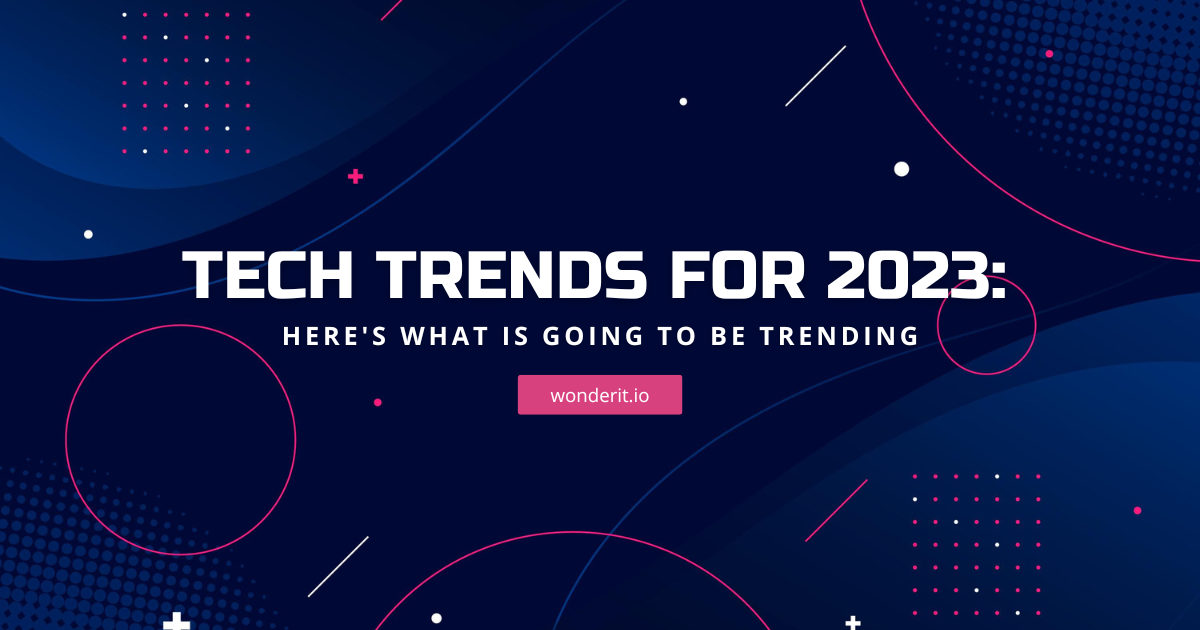Tech Trends will shape 2023. Recent years have seen a period of increased global instability marked by pandemics, inflation, geopolitical turmoil, supply issues, blockades, etc.
Due to this challenging economic landscape, it is an excellent moment to change how we conduct business and a crucial time to adopt new technological solutions that help organizations in surviving these difficult times and turn them into a competitive advantage.
We review the tech trends that will transform business in 2023, which you should follow closely.
Top 6 Tech Trends 2023
1. Metaverse
At the end of 2021, the company Facebook Inc., which provides the social networks Facebook and Instagram and the instant messaging service WhatsApp, changed its company name to Meta.
A change that, according to the company’s owner Mark Zuckerberg, is due to the need to create a “metaverse”.And what exactly is a metaverse? It can currently be thought of as a three-dimensional virtual world. There is no unified definition, though. Others refer to it as an ecosystem that combines various virtual worlds that offer users an immersive experience and where various daily activities can be carried out. Some describe it as an evolution of the Internet, while others speak of the convergence between our physical space and the digital environment.
Currently, we can distinguish between metaverses that make use of Blockchain technology and those that do not. In the first case, we can find examples such as Decentraland, where Blockchain technology grants certain platform interoperability, empowering the use of coins (MANA cryptocurrency) in this 3D universe on other platforms. In the second situation, we see examples like the video game Fortnite, where a player can purchase items and use the in-game currency exclusively on that platform.
2. Adaptive AI
An increasing number of companies are implementing artificial intelligence systems to enhance customer service, create clever and self-sufficient solutions, and improve their market competitiveness.
Adaptive AI, the first of our tech trends, goes above and beyond the conventional Machine Learning models that have previously been deployed. While changes in the operating environment can have a substantial impact on the level of functional accuracy and efficiency of traditional AI systems, adaptive learning-based AI systems adopt a flexible and continuously improved approach. By doing so, the algorithm may continue to update old forecasts while also monitoring and learning from changes as they happen.
3. Platform Engineering
As adoption grows and digital platforms mature, expect to see an increased emphasis on customization. Platform engineering provides a set of tools and skills that are created and organized for usability. This could result in more efficient workflows for both development teams and end users.
4. Superapps
Superapps provide a platform from which third parties can create and distribute their own mini-apps by combining the capabilities of an app, a platform, and a digital ecosystem into a single application. The superapp can contain micro or mini-apps that can be activated by the end user for a more customized app experience.
5. Intelligent Automation
Intelligent automation has appeared on this list in previous years, and just like moving to the cloud, it continues to be ground-breaking and so it’s something we’re keeping our eyes on.
Intelligent automation is ready to take off with products like Microsoft Power Automate and Automation Anywhere A360 attracting so many suitors and promoting competitive account migrations.
Power Automate features AI-enhanced workflows and an AI Builder capability. The most recent product from Automation Anywhere includes AI and machine learning right in the platform, making both systems true intelligent automation solutions.
Artificial intelligence is prevalent in trend commentaries that look to the future. Another illustration of this is the actual development of intelligent automation and the use of AI to automate complicated, end-to-end, decision-based business processes.
6. Datafication
Datafication is simply transforming everything in our life into devices or software powered by data. So, to summarize, datafication is the conversion of manual labor-intensive operations into technology that is driven by data. Data is here to stay for longer than we can ever remember, from our smartphones, industrial machinery, and workplace applications to AI-powered gadgets and everything else! Therefore, maintaining our data in a secure and safe manner has become a sought-after specialty in our economy.
Datafication leads to a higher need for IT professionals, data scientists, engineers, technicians, managers, and so much more.
Even more helpful is the availability of certification programs in data-related specializations for anyone with a sound knowledge of technology who wants to work in this field. When it comes to data employment, talents are more important than high-level degrees, and we are seeing a lot of effective leaders emerge from smaller cities. By taking a course like RPA to better your understanding of how automation functions in the realm of data, you can also arm yourself with this useful trending talent.
Bottom Line
Whether you’re looking to adopt tech that optimizes your business or looking to undergo a full digital transformation, familiarizing yourself with the latest tech trends is essential for forward-thinking business leaders and entrepreneurs.
Contact WonderIT to speak with our experts about what tech solutions are right for you.


Recent Comments